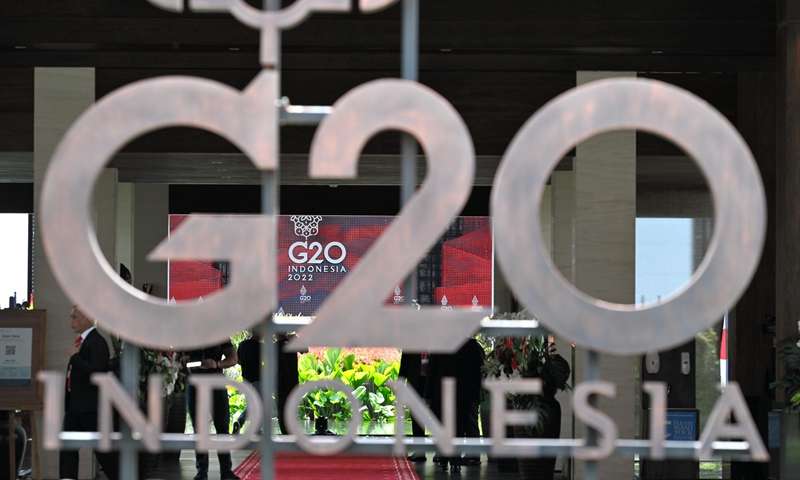
G20 Photo:VCG
Speaking at the G20 Leaders' Summit in Bali, Indonesia on Tuesday, Chinese President Xi Jinping called for unity and inclusive global development as the world faces major challenges, while warning that drawing ideological lines and promoting group politics and bloc confrontation will only divide the world and undermine global development.
The G20 summit kicked off on the Indonesian resort island on Tuesday morning. After arriving at the main venue for the summit, greeted by Indonesia President Joko Widodo, world leaders started the first working session, which focused on global food and energy security.
During his speech, Xi said that food and energy security is the most pressing challenge in global development and the root cause of the current crisis is not production or demand but disrupted supply chains and international cooperation. The solution lies in coordination among countries under the UN and other multilateral international organizations, Xi said.
"We must firmly oppose the attempt to politicize food and energy issues or use them as tools and weapons,, remove unilateral sanctions and cancel restrictions on related science and technology cooperation ," Xi told world leaders, stressing that China has made major contributions to global food and energy security.
Under the theme of "Recover together, Recover Stronger," the G20 summit in Bali is aiming for global cooperation on the global economic recovery from the COVID-19 pandemic and other downward pressures given the global influence of the G20.
The G20 stands for the group of 20 largest economies in the world, which together accounts for more than 80 percent of the world's gross domestic product, 75 percent of international trade and 60 percent of its population.
The grouping was initially founded in 1999 after the Asian financial crisis and emerged as the principal forum for coordinating an international response to the global financial crisis of 2008; however, in recent years, as geopolitical friction has grown, division within the G20 has also become increasingly prominent as some Western countries, including the US, seek to focus on geopolitical tension at the summit.
Highlighting the tension, many reporters covering the event in Bali were focused on whether the world leaders will reach a communique or whether they will even pose for a group photo.
However, despite the tension, many world leaders also called for global cooperation and affirmed opposition to conflict during the summit.
During his speech on Tuesday morning, Xi said that as human development faces major challenges, division should be replaced by unity, confrontation should be replaced by cooperation and exclusion should be replaced by inclusiveness.
"Facing various risks and challenges, we should pull together in times of trouble. Drawing ideological lines and promoting group politics and bloc confrontation will only divide the world and undermine global development and human advancement," Xi said, stressing that a Cold War mentality is obsolete as human civilization has already entered the 21st century.
At the working session on Tuesday morning, Widodo also told world leaders that "we shouldn't divide the world into parts. We must not let the world fall into another cold war," according to Bloomberg.
Other world leaders also warned the dire consequences of division and protectionism for the global economy.
Kristalina Georgieva, managing director of the International Monetary Fund, said in remarks to the summit that protectionism must not be allowed leading the world to drift into separate blocs, warning a divided world would forfeit at least 1.5 percent of GDP annually, Bloomberg reported.




